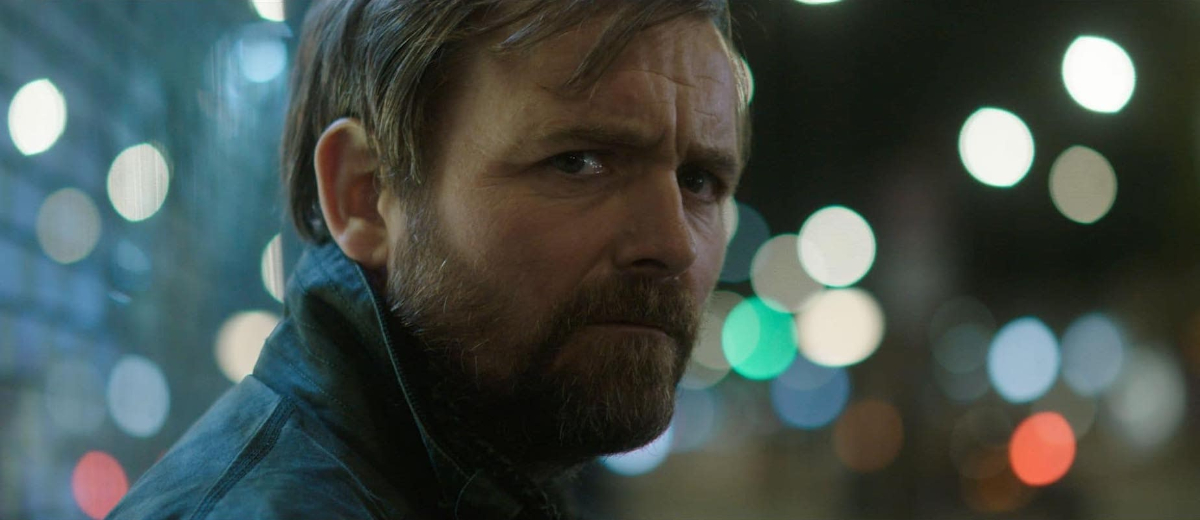What to Watch Verdict
'Bull' becomes a breakneck warpath that isn’t much more than another addition to the pantheon of risen warriors fighting back—execution is just a swipe, stab, and dismemberment above.
Pros
- +
🔪 Baddies die hard.
- +
🔪 Neil Maskell is a man possessed.
- +
🔪 Simplicity in its brutal intentions.
Cons
- -
🔪 The time-hopping narrative can blur together.
- -
🔪 Cards are held a little too long.
- -
🔪 Might be slight for some.
Bull is part of our Fantasia Fest 2021 coverage.
All hail a revenge thriller like Bull that—why not—bullishly barrels head-first into vindictive, punitive action thrills. There's no gristle on this bloody chophouse punching bag. Paul Andrew Williams writes and directs an organically shocking string of violence that stems from sins characters cannot outrun, as guns, knives, and more weapons emphasize the film's humble brutality. It's not immeasurably unique given how one man bashes and slashes his way through those who bleed their karmic paybacks, but effective since intimately furious vengeance is only ever a slice, puncture, or shotgun blast away.
Neil Maskell stars as the titular "Bull," a disgraced criminal thug whose position as Norm's (David Hayman) muscle unceremoniously goes up in flames. Bull happens to be sweeties with Norm's daughter Gemma (Lois Brabin-Platt), which has led to Bull's pride and joy, his adoring son Aiden (Henri Charles). For subsequently revealed reasons, Norm lights Bull's trailer ablaze to set his daughter free—some ten years before Bull reappears like a ghost from everyone's past. They tried to erase Bull from existence, and now he's returning the favor. One by one, Norm's inner circle tumbles like dominoes (aka gets mutilated) with Norm's piece at the finish line.
The mystique of Bull is not worth spoiling since Williams adopts a fractured timeline narrative that spans a decade's worth of trauma and torture. It's a proper mystery as to Bull's reemergence since the credits roll over Norm's cronies burying Bull six feet under—then we're watching a rather healthy-looking, risen from ashes Bull aerating bodies with steel tools. Cinematography jumps back-and-forth between Bull's past life as an appendage-removing henchman to his current raging inferno of a dispatched father. We wrestle with the dedicated family man who now kills in the name of his kin—the one seen fishing and playfully spraying hose water during picnics with a softer, more human Bull—juxtaposed against the visceral brutality committed in the boy's name. Bull just wants his family back, or at least the parts still worth a damn (Gemma is now with another of Norm's flock).
That's the selling point of Bull—it's no bullshit, cocked-and-loaded action that's more akin to 2008's The Horseman (available on Tubi, highly recommend) that gets right to the sharpened, Ginsu-slick point. Bull's wake of assassinations aren't flashy, but pass messages to Norm that are the grimmest, nastiest visual cues, be it a blade sticking out of a thug's open mouth, blood-spewing, or the hacked-off hand (with some bonus wrist) of a protein-packing footballer. We're not talking about wildly choreographed fight sequences like The Raid or flashy theatrics like in Joe Carnahan's work such as Smokin' Aces. Each of Bull's eliminations is an expression of due justice and suffering, which becomes compelling visual storytelling through practical effects that hit with immense force, slicing and dicing via maximum physical punishment.
The jumpiness mentioned above may also throw some audiences, as the same landmark settings are interspersed between flashbacks and reunions. Bull's inferno of a trailer home—seen on the poster—is a frequent returning point, as well as a fairground with Ferris Wheel attractions, flashing colored lights, and carnival music. The problem can become parsing out when in Bull's chronology each scene takes place, not to say it's deceptively complex. Maskell's imposition and man-possessed arc as "Bull" is the main draw whether he's beating the high score on an arcade punch machine or he's rewalking the same event grounds with a sullen face, contemplating the ruthless quest that lays ahead. It's not to say the back-and-forth between Bull's intended hit (that doesn't work) is disjointed or crosses too many wires—more just a disclaimer, as a bit more editing clarity could have tightened the film's laces to wrap around Bull's fists with form-fitting grips.
That's all you need to know about Bull. Paul Andrew Williams' kill-or-be-killed flick concerning rural English criminal undergrounds pridefully boasts butcher's block messages that continually circle back to outrunning one's past (unsuccessfully). Neil Maskell relishes Bull's searing gazes ready to shoot fireballs or dastardly quips that never spoil the boundaries he's willing to ignore (beckoning one of his adversaries and children into his hatchback together, for example). There's so much sorrow, and pain translates through not just bruised, wounded, discarded bodies—for good measure, Williams summons a horror bend that's the sendoff chef's kiss. At under ninety minutes? Bull becomes the breakneck warpath that isn't much more than another addition to the pantheon history of risen warriors fighting back—execution is just a swipe, stab, and dismemberment above.
The latest updates, reviews and unmissable series to watch and more!
Matt Donato is a Rotten Tomatoes approved film critic who stays up too late typing words for What To Watch, IGN, Paste, Bloody Disgusting, Fangoria and countless other publications. He is a member of Critics Choice and co-hosts a weekly livestream with Perri Nemiroff called the Merri Hour. You probably shouldn't feed him after midnight, just to be safe.


